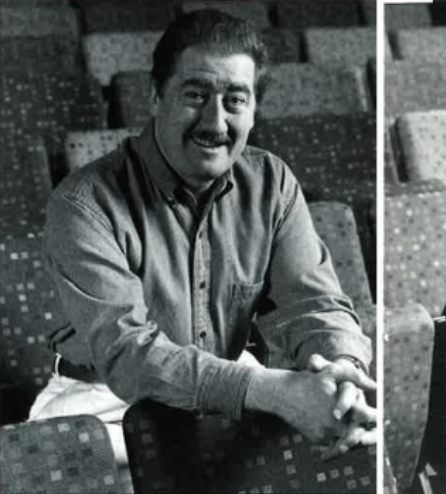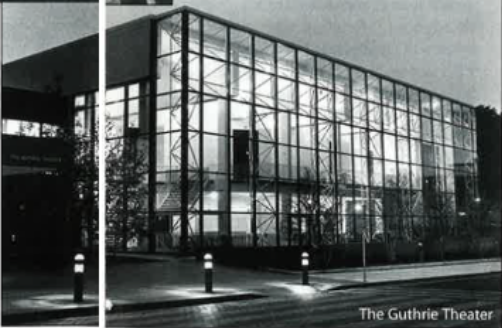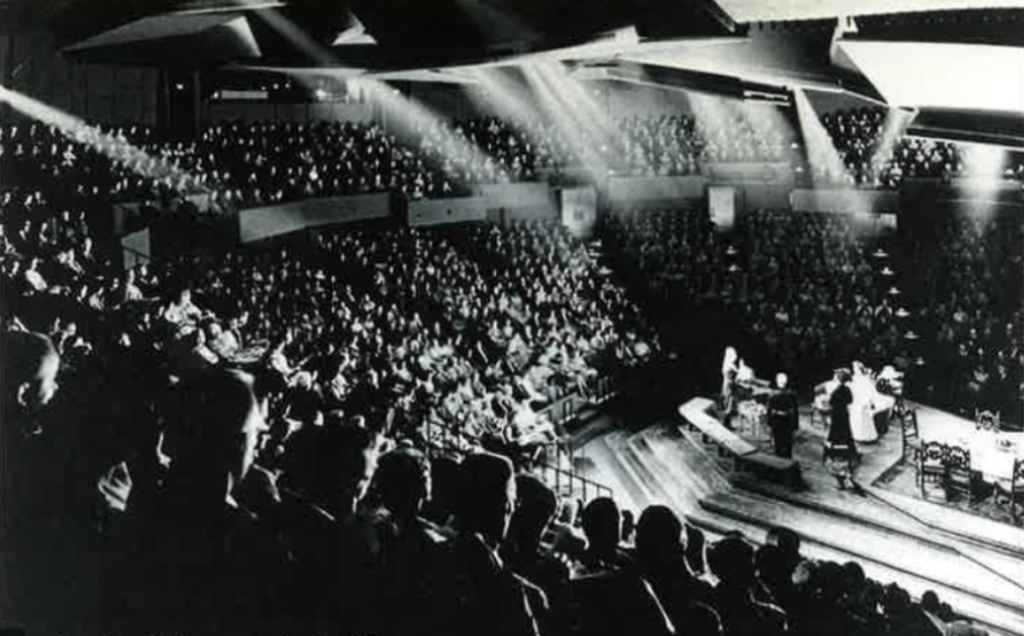You wouldn’t expect the artistic director of one of the country’s most celebrated repertory theaters to make house calls, but if Dublin-born Joe Dowling, creative wizard in residence at the Guthrie Theater in Minneapolis, thought his presence at a barbecue or bar mitzvah would put some people in his theater’s seats, the folks throwing the party would be well advised to set another place at the table.
Not since the arrival of Sir Tyrone Guthrie, the implacable Irish impresario who personally planned and presided over construction of the theater more than 30 years ago, has anyone associated with the arts achieved such high-profile status as quickly as Dowling. Sir Tony, as he’s fondly remembered here, would no doubt be pleased with his successor’s approval rating since Joe’s job is to lure people back to the theater that bears Guthrie’s name.
Dowling has so many friends and supporters in the Twin Cities of Minneapolis and St. Paul that it wouldn’t surprise anyone if he garnered a few write-in votes for governor next fall, a compliment usually reserved for superstar heroes of local athletic teams.
When London Assurance, the Dowling directed comedy staged for New York’s Roundabout Theater Company while the Guthrie was on hiatus, received three Tony nominations, headlines here read “Guthrie’s Dowling Wins Over Broadway,” ignoring the fact that Joe had triumphed on the Great White Way long before he found himself in the Great White North.

Getting noticed wasn’t a problem for Joe. Although St. Paul boasts a fairly sizable Irish-American population (and even has a St. Patrick’s Day parade), most of Minnesota, including Minneapolis and surrounding suburbs, is swarming with Scandinavians, the nieces and nephews of those Norwegian bachelor farmers radio humorist (and Minnesota native) Garrison Keillor keeps telling us about.
Finding themselves mesmerized by Dowling’s bodacious brogue, the locals were curious to see why he seemed so excited about the goings on at the Guthrie.
As Dowling sees it, in addition to the usual chores one would expect an artistic director to do — select plays for the season, hire directors, round up actors and worry over every creative aspect of each production-winning friends and influencing people is all in a day’s work.
“One of my key jobs is to be the face of the theater,” says the man who honed his administrative and hand-shaking skills while wearing a similar hat at Dublin’s Abbey Theater for seven seasons. “I don’t want people’s opinion of what we hope to do at the Guthrie to be formed by something they find stuffed in their letter boxes. It takes a huge amount of my time, but the theater has to be associated with a human being, otherwise it becomes a very cold institution indeed.”
As enthusiasm for the Guthrie waned under Dowling’s predecessor, Garland Wright, grass roots theater companies filled the void, offering contemporary works that drew audiences away from their better known neighbor.
With the exception of sell-out performances of A Christmas Carol, a Guthrie holiday staple for more than 20 years, box office receipts left little to cheer about. The most embarrassing financial flogging of all came about when Wright’s final production, a revival of the 1937 musical, Babes in Arms, lost more than $1 million.
With ticket sales sinking out of sight, the Guthrie’s governing body set about finding a creative director just as talented, and considerably more gregarious, when Wright announced his decision to depart. When they discovered Dowling working his magic in New York, they knew they had their man, initially offering a three-year contract which was recently extended to run through the year 2000.
For Joe, the timing was perfect. On top of his game after a string of successes in Washington and New York, he had been thinking of hanging his creative hat in this country for a spell. “I found myself drawn to America,” Dowling admits. “I was dividing my time between running the Gaiety School of Acting in Dublin and directing here and I finally decided it was one or the other.” Dowling, who remains on the Gaiety’s board of directors, had just returned from graduation ceremonies at the school the day we met in his underground office. “I literally arrived in Dublin on Thursday afternoon and left on Sunday morning,” he explained matter of factly.
“That left virtually no time to visit family or friends. I go over about four times a year, usually for business purposes. One year when my wife, Siobhan, was working in Dublin and I was in this country, I was across the Atlantic 20 times.”
With Siobhan, a popular TV journalist in Ireland who hopes to duplicate that success here, and the couple’s two children, Susanna and Ronan, reunited in Minneapolis, Joe spent more time trundling around town in his Toyota than racking up frequent flyer miles.
He won his cohorts’ confidence by taking in every show he could, turning the Guthrie stage over to Penumbra’s players for a production of August Wilson’s Pulitzer Prize-winning Fences and announcing plans to collaborate with another local company, Mixed Blood, to produce a new play, Black No More, at the Guthrie
Lab, a smaller sister house, next year. Joe’s speeches often touch on the challenge of putting together a successful season, a task he finds difficult indeed. “Balancing the need to have comedy, tragedy and drama is very demanding,” he explains, “and you never know with a play. It’s the most extraordinary thing. It either works or it doesn’t, and you can never tell in advance.”
Every play Dowling picked for his first season proved to be a winner. Brilliantly crafted productions of some of his favorite works, opening with The Cherry Orchard and closing with A Midsummer Night’s Dream, won praise from critics, brought 43,000 more people through the door and deposited badly needed dollars in the Guthrie’s bank account.
What can he do for an encore? Even Joe isn’t totally sure, but he’s eager to find out. “The welcome was extraordinary and obviously very gratifying,” he says, reflecting on his debut season. “I’m sure much of it had to do with a well of affection for the theater itself.”
Joe knows wells can go dry, and he isn’t taking any chances, going into his second season with a lineup he concedes could be called “Joe’s greatest hits, part two.” Among them are Blithe Spirit, Racing Demon, The Playboy of the Western World and Much Ado About Nothing. He’ll direct all but Racing Demon and Thunder Knocking on the Door, Keith Glover’s new “bluesical” which features a band on stage.

The Guthrie, which operates on a “festival schedule,” has sometimes started its season as early as May. Dowling felt confident enough to tinker with tradition this year, pushing the opening night of You Can’t Take It With You, directed by Douglas Wager, back to mid-July, citing Minnesota’s short summer as the reason.
“It’s a rare event when the weather allows people to get outside here,” he says, only half joking. “To invite them indoors too early in the season tends to make them a little cross.” Joe’s instincts proved perfect as the Kaufman and Hart comedy opened to packed houses and rave revues. When it comes to picking winners, Joe says his formula for success is simple.
“Not knowing exactly what the audience wants, I pick plays I like myself,” he quips. He went boldly where the Guthrie had never gone before when he selected a personal favorite, Brian Friel’s Philadelphia, Here I Come, for presentation last year. Knowing it was risky to stage the play before an audience largely unfamiliar with the works of Irish playwrights, he felt he had no choice.
“It’s essential to me to do Irish plays,” says Dowling. “I don’t think I could ever work on a repertoire that didn’t include Irish plays. For me to be honest with an audience, they have to see that side of my work.
“Many people thought they were coming to see The Philadelphia Story,” Dowling says with a laugh, “and some were disappointed when Grace Kelly didn’t show up, but they gave it a chance and came away saying, “Wow, this is a world I didn’t know anything about, but I appreciate it, and understand it.”
Guthrie audiences will have an opportunity to experience what Joe calls “the world that I’m a part of” at the end of January when Playboy of the Western World makes its first appearance at the Guthrie. Synge’s masterpiece faces two major challenges. The first, that few people have heard of it, let alone seen it. The second, and probably more critical, that it will open January 21, historically the coldest time of year here. If Dowling is shivering in his boots, he’s not letting it show.
“It gives me, as an Irishman, tremendous joy to bring this play here for the first time,” Joe says with genuine pride. “It’s such a universal play in terms of a young man coming to maturity and finding himself despite diversity that I think it can transcend the same way Philadelphia did. I hope the audience will give it a chance.”
However, it’s unlikely that Joe will stay on the frozen tundra forever. “It’s hard to plan in this business,” he says, drawing upon personal experience. “I never planned to be here. It happened, and I’m very happy it happened, but one never knows what will happen next. Both my wife and I know we won’t stay out of Ireland forever. We’ll go back. What we do when we go back is another matter, but we will go back.”
It’s difficult to believe that Joe’s return would lead to anything other than exciting theater at one venue or another, combined, of course, with some fascinating stories about his American adventure to be shared with family and friends.
But with a new contract in hand that will keep him moored in Minnesota into the new millennium, it’s likely to be a long time before the folks in Dublin get to hear Joe tell his tales.
Editor’s Note: This article was originally published in the January / February 1998 issue of Irish America. ⬥


Leave a Reply